By Leen Randell
Updated: Jul 04, 2024
10 Best Herbal Decoctions For Gastritis
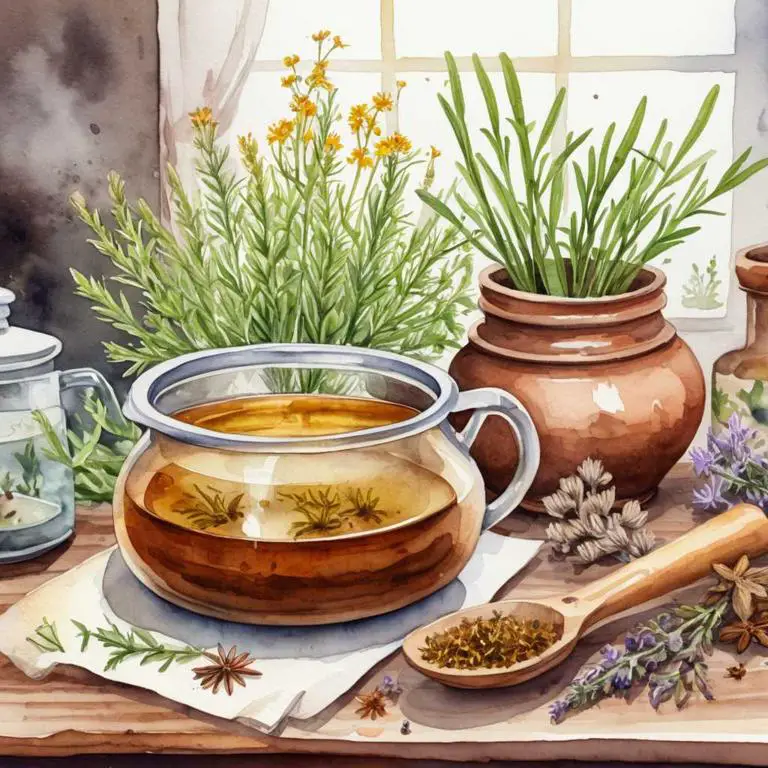
Herbal decoctions for gastritis are a natural remedy that involves steeping herbs in hot water to create a soothing liquid extract.
These decoctions help alleviate symptoms of gastritis, such as heartburn, bloating, and stomach pain, by reducing inflammation and calming the digestive tract. Examples of herbal decoctions that provide relief from gastritis include peppermint, chamomile, and ginger, which can be consumed as tea or added to meals.
By incorporating these natural remedies into daily routines, individuals with gastritis can experience improved digestion, reduced discomfort, and enhanced overall well-being.
The following article describes in detail the most important decoctions for gastritis, including medicinal properties, parts of herbs to use, and recipes for preparations.
- 1. Mentha x piperita
- 2. Zingiber officinale
- 3. Glycyrrhiza glabra
- 4. Matricaria chamomilla
- 5. Panax quinquefolius
- 6. Taraxacum officinale
- 7. Symphytum officinale
- 8. Sambucus nigra
- 9. Passiflora incarnata
- 10. Rosa rugosa
- What is the best combination of herbal decoctions to use for gastritis?
- What ailments similar to gastritis are treated with herbal decoctions?
1. Mentha x piperita
Peppermint decoctions helps with gastritis because of its natural anti-inflammatory properties, which soothe the stomach lining and reduce inflammation.
The menthol present in peppermint also relaxes the muscles in the digestive tract, easing symptoms such as bloating, cramps, and nausea.
Additionally, peppermint's calming effects on the digestive system help to alleviate irritability and discomfort associated with gastritis, allowing for a smoother digestion process and relief from symptoms.
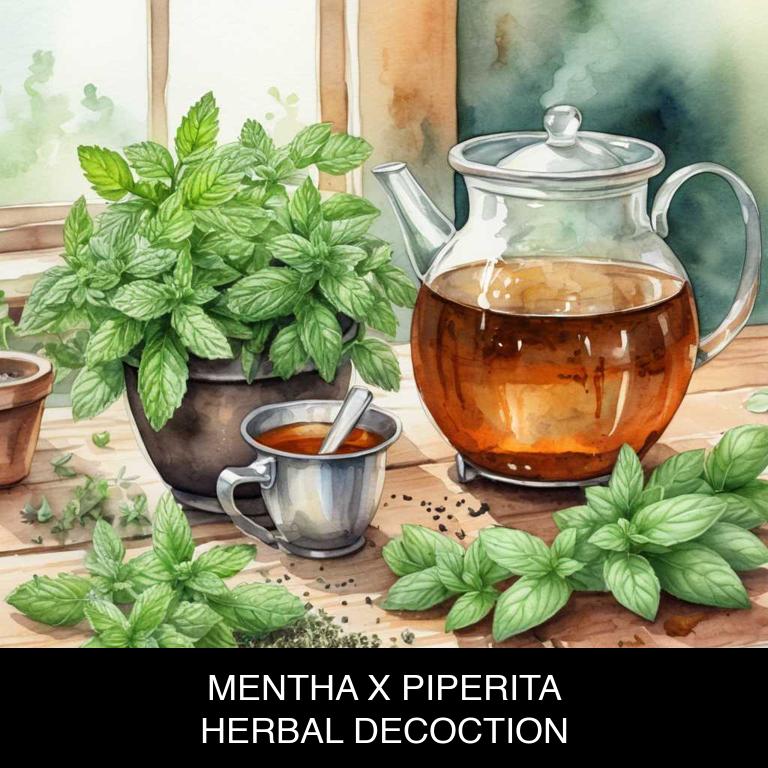
Medicinal Constituents
The list below shows the primary medicinal constituents in Mentha x piperita decoctions that help with gastritis.
- Menthol: Menthol has analgesic and anti-inflammatory properties, which help to reduce pain and inflammation in the stomach lining associated with gastritis.
- Menthone: Menthone has antibacterial properties, which help to reduce the growth of Helicobacter pylori bacteria that can contribute to gastritis.
- Menthyl acetate: Menthyl acetate has anti-inflammatory and antioxidant properties, which help to reduce inflammation and oxidative stress in the stomach lining, promoting healing and reducing symptoms of gastritis.
Parts Used
The list below shows the primary parts of peppermint used to make decoctions for gastritis.
- Leaves: The leaves are the most commonly used part due to their high concentration of essential oils, particularly menthol and menthone, which have anti-inflammatory and digestive properties.
- Roots: The roots of Mentha x piperita are used due to their ability to stimulate digestion and reduce inflammation in the stomach, making them a popular choice for treating gastritis.
- Stems: The stems are used in decoctions for gastritis as they contain a significant amount of menthol, which helps to soothe the stomach and reduce symptoms of gastritis.
Quick Recipe
The following recipe gives a procedure to make a basic peppermint for gastritis.
- Harvest 1-2 tablespoons of fresh mentha x piperita leaves and flowers for every 8 ounces of water used.
- Chop the harvested leaves and flowers into small pieces to release their active compounds.
- Combine the chopped herb with 8 ounces of boiling water in a heat-resistant container.
- Steep the mixture for 5-10 minutes allowing the active compounds to infuse into the water.
- Strain the decoction through a cheesecloth or a fine-mesh sieve into a clean container.
2. Zingiber officinale
Ginger decoctions helps with gastritis because its active compounds, such as gingerols and shogaols, possess anti-inflammatory and antioxidant properties.
These properties help to reduce inflammation in the stomach lining, alleviating symptoms of gastritis such as pain, bloating, and nausea. Additionally, ginger's natural antibacterial and antiviral properties may also help to combat underlying infections that can contribute to gastritis.
By soothing and calming the digestive tract, herbal ginger decoctions provide a natural remedy for managing gastritis symptoms.
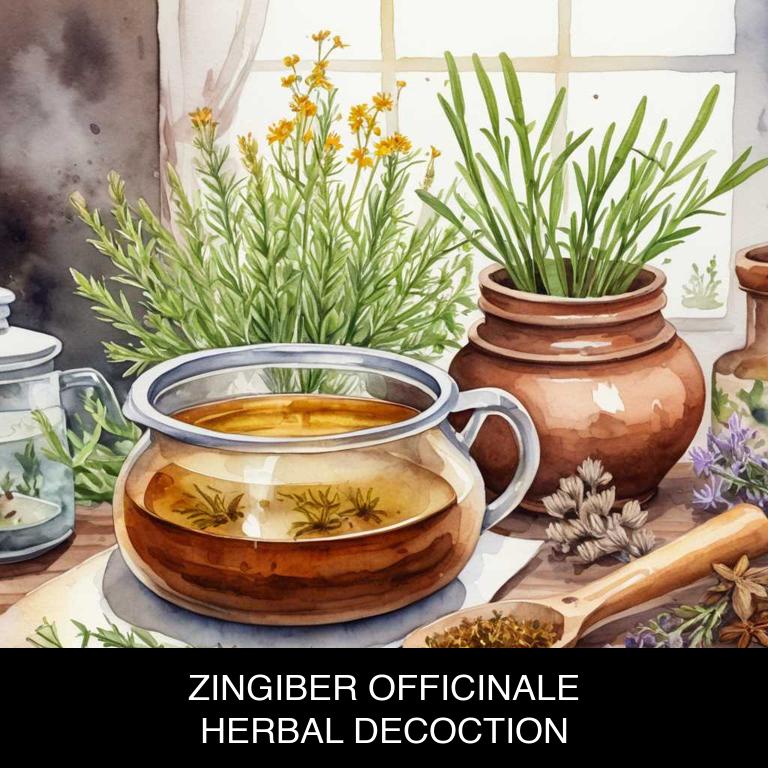
Medicinal Constituents
The list below shows the primary medicinal constituents in Zingiber officinale decoctions that help with gastritis.
- Gingerols: These iridoid compounds have anti-inflammatory properties, which help reduce inflammation and alleviate pain in the stomach, thereby providing relief from gastritis symptoms.
- Shogaols: Similar to gingerols, shogaols possess anti-inflammatory and antioxidant properties, which help protect the stomach lining from damage, reduce inflammation, and alleviate gastritis symptoms.
- 6-gingerol: A primary bioactive compound in ginger, 6-Gingerol has anti-inflammatory and antioxidant properties that help reduce inflammation, prevent oxidative stress, and provide relief from gastritis symptoms.
Parts Used
The list below shows the primary parts of ginger used to make decoctions for gastritis.
- Rhyzomes: They are rich in gingerols and shogaols, which have anti-inflammatory properties that help soothe and protect the stomach lining.
- Roots: The roots contain a high concentration of gingerol, which helps to reduce inflammation and alleviate symptoms of gastritis.
- Stems: The stems also contain gingerol and other bioactive compounds that may help to calm the digestive system and reduce inflammation.
Quick Recipe
The following recipe gives a procedure to make a basic ginger for gastritis.
- Gather 2-3 grams of dried zingiber officinale root and 1 liter of water for decoction preparation.
- Grind the dried zingiber officinale root into fine powder using a mortar and pestle for 2 minutes.
- Combine 2-3 grams of ground zingiber officinale root with 1 liter of water in a saucepan.
- Boil the mixture over high heat for 10-15 minutes or until the liquid reduces to 200ml.
- Strain the decoction through a cheesecloth into a separate container to remove the solids.
3. Glycyrrhiza glabra
Licorice decoctions helps with gastritis because of its anti-inflammatory properties, which soothe and calm irritated stomach tissues.
The extract from licorice root contains glycyrrhizin, a compound that has been shown to reduce inflammation in the digestive tract, thereby providing relief from symptoms such as abdominal pain, bloating, and nausea. Additionally, licorice decoctions have been found to possess antimicrobial properties, which can help eliminate Helicobacter pylori bacteria, a common cause of gastritis.
As a result, herbal licorice decoctions offer a natural and effective way to manage gastritis symptoms.

Medicinal Constituents
The list below shows the primary medicinal constituents in Glycyrrhiza glabra decoctions that help with gastritis.
- Saponins: Saponins in Glycyrrhiza glabra decoctions help with gastritis by reducing inflammation, protecting the mucosal lining of the stomach, and inhibiting the production of gastric acid.
- Glycyrrhizin: Glycyrrhizin helps with gastritis by reducing inflammation, protecting the stomach lining from acid damage, and exhibiting anti-ulcerative properties.
- Flavonoids: Flavonoids in Glycyrrhiza glabra decoctions help with gastritis by exhibiting antioxidant and anti-inflammatory effects, which protect the stomach lining from oxidative damage and inflammation.
Parts Used
The list below shows the primary parts of licorice used to make decoctions for gastritis.
- Roots: The roots of Glycyrrhiza glabra are commonly used due to their high content of glycyrrhizin, a compound that has anti-inflammatory and soothing properties.
- Leaves: The leaves of Glycyrrhiza glabra are also used for their medicinal properties, including anti-inflammatory and antioxidant effects, which help in soothing gastritis.
- Barks: The barks of Glycyrrhiza glabra are sometimes used in decoctions to treat gastritis due to their ability to reduce inflammation and promote digestion.
Quick Recipe
The following recipe gives a procedure to make a basic licorice for gastritis.
- Harvest 30-60 grams of dried roots of glycyrrhiza glabra in late summer or early fall.
- Cut the roots into small pieces and weigh them to ensure the correct dosage.
- Combine the root pieces with 1 liter of water in a saucepan and bring to a boil.
- Simmer the mixture for 5-10 minutes and then reduce the heat to a low setting.
- Strain the decoction through a cheesecloth and discard the solids to obtain the herbal liquid.
4. Matricaria chamomilla
Chamomile decoctions helps with gastritis because it possesses anti-inflammatory properties that soothe the digestive tract, reducing inflammation and irritation.
The apigenin and flavonoids present in chamomile work together to calm the stomach lining, decreasing acid production and alleviating symptoms such as burning, bloating, and discomfort.
Additionally, chamomile's relaxing effects on the muscles of the digestive system help to reduce spasms and cramps associated with gastritis, promoting a sense of relief and relaxation.
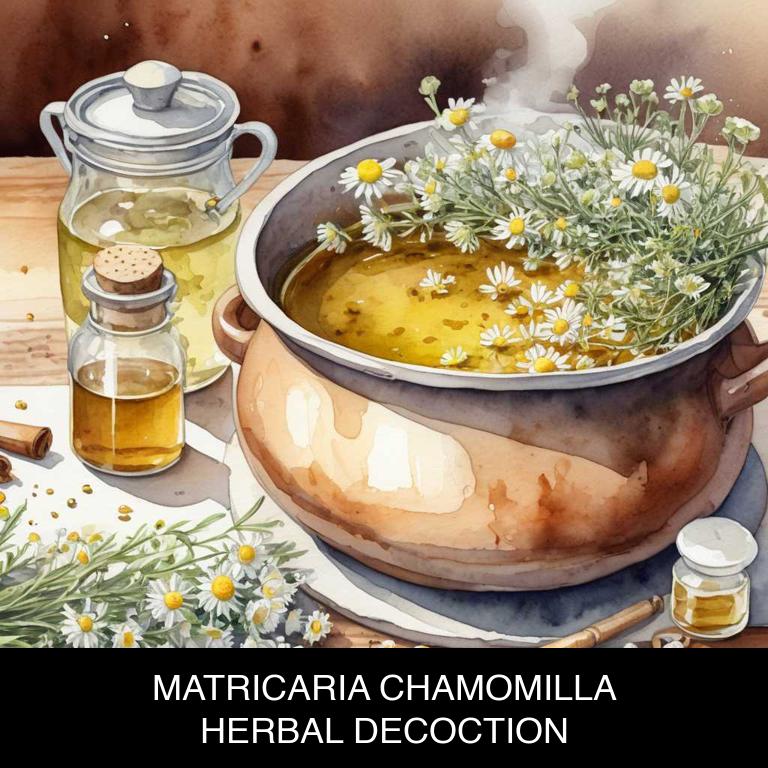
Medicinal Constituents
The list below shows the primary medicinal constituents in Matricaria chamomilla decoctions that help with gastritis.
- Apigenin: Apigenin is a flavonoid that helps to reduce inflammation and alleviate gastritis symptoms by inhibiting the production of pro-inflammatory cytokines.
- Matricaria chamomilla flavonoids: These flavonoids possess anti-inflammatory and antioxidant properties, which help to soothe and protect the stomach lining, thereby reducing gastritis symptoms.
- Matricaria chamomilla terpenes: These terpenes exhibit anti-inflammatory and soothing effects, which can help to calm the stomach and reduce inflammation associated with gastritis.
Parts Used
The list below shows the primary parts of chamomile used to make decoctions for gastritis.
- Flowers: They are used due to their anti-inflammatory and soothing properties.
- Leaves: They are used because they contain flavonoids and terpenoids that help alleviate gastritis symptoms.
- Seeds: They are used due to their carminative properties, which help to reduce gas and alleviate discomfort in the stomach.
Quick Recipe
The following recipe gives a procedure to make a basic chamomile for gastritis.
- Gather 30-40 dried flowers of matricaria chamomilla for a decoction that soothes digestive issues.
- Measure 1 teaspoon of the dried flowers for a single serving of the decoction.
- Combine the measured flowers with 1 cup of boiling water in a heat-resistant glass cup.
- Steep the mixture for 5-7 minutes to allow the active compounds to infuse into the water.
- Strain the decoction through a fine mesh or cheesecloth to remove the solids and discard the residue.
5. Panax quinquefolius
American ginseng decoctions helps with gastritis because it exhibits anti-inflammatory properties that soothe irritated gastric mucosa, reducing inflammation and discomfort.
Its bioactive compounds also enhance digestion, improving gut motility and nutrient absorption. Additionally, American ginseng has been shown to have a protective effect on the stomach lining, reducing the risk of ulcers and promoting healing.
By addressing underlying inflammation and digestive issues, American ginseng decoctions can provide relief from gastritis symptoms and promote overall gastric health.
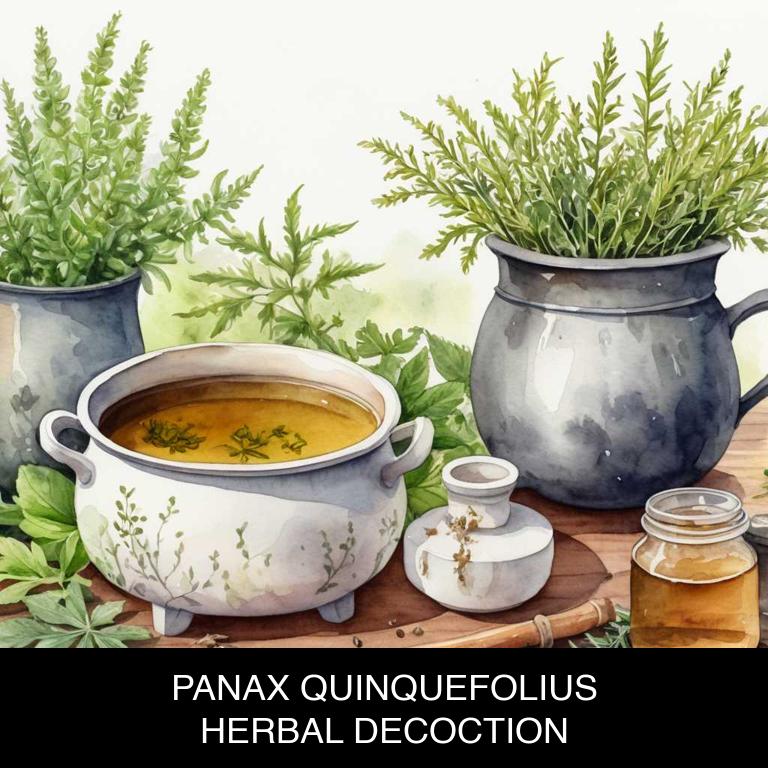
Medicinal Constituents
The list below shows the primary medicinal constituents in Panax quinquefolius decoctions that help with gastritis.
- Ginsenosides: These triterpenoid saponins in Panax quinquefolius have anti-inflammatory properties, which can help reduce inflammation and alleviate gastritis symptoms.
- Flavonoids: Specifically, quercetin and kaempferol, are flavonoids found in Panax quinquefolius that exhibit antioxidant and anti-inflammatory activities, which can help protect the stomach lining and alleviate gastritis symptoms.
- Sesquiterpenes: Compounds like sesquiterpenoid quinquefolin have been shown to possess anti-ulcerogenic properties, which can help protect the stomach lining and prevent further gastritis damage.
Parts Used
The list below shows the primary parts of american ginseng used to make decoctions for gastritis.
- Roots: The roots are the most commonly used part due to their high concentration of ginsenosides, which are believed to have anti-inflammatory properties that help alleviate gastritis symptoms.
- Barks: The barks are used to make decoctions due to their content of flavonoids and lignans, which are thought to have antioxidant and anti-inflammatory effects that aid in gastritis treatment.
- Stems: The stems are utilized for their saponin content, which is believed to have anti-inflammatory and antioxidant properties that help soothe gastritis symptoms.
Quick Recipe
The following recipe gives a procedure to make a basic american ginseng for gastritis.
- Gather 2-3 dried panax quinquefolius roots, cut into small pieces, weighing about 10-15 grams each.
- Combine the dried root pieces with 1 liter of cold water in a saucepan, adding 10-15 grams of fresh ginger root.
- Bring the water to a boil over high heat, then reduce the heat to medium-low and simmer for 30-40 minutes.
- Strain the decoction through a cheesecloth or a fine-mesh sieve into a clean container, discarding the solids.
- Allow the decoction to cool to room temperature, then refrigerate or store in an airtight container for up to 3 days.
6. Taraxacum officinale
Dandelion decoctions helps with gastritis because they stimulate digestive enzymes, reducing inflammation and discomfort in the stomach and intestines.
The bitter compounds present in dandelion roots and leaves help to activate digestion and improve gut motility, alleviating symptoms such as bloating, nausea, and abdominal pain.
Additionally, dandelion's anti-inflammatory properties help to soothe and calm the digestive tract, promoting a healthy gut microbiome and reducing gastritis-related discomfort.

Medicinal Constituents
The list below shows the primary medicinal constituents in Taraxacum officinale decoctions that help with gastritis.
- Taraxasterol: This triterpenoid saponin helps with gastritis by reducing inflammation and protecting the stomach lining from damage caused by acid and digestive enzymes.
- Taraxanthin: A xanthophyll carotenoid, Taraxanthin has anti-inflammatory and antioxidant properties, which help to alleviate gastritis symptoms by reducing oxidative stress and inflammation in the stomach.
- Taraxasterol acetate: This triterpenoid saponin has been shown to have anti-inflammatory and protective effects on the stomach lining, helping to prevent gastritis by reducing inflammation and promoting healing.
Parts Used
The list below shows the primary parts of dandelion used to make decoctions for gastritis.
- Leaves: The leaves of Taraxacum officinale are used due to their anti-inflammatory properties, which can help soothe digestive issues associated with gastritis.
- Roots: The roots of the plant are used for their bitter compounds, which have been traditionally used to treat digestive issues and stimulate digestion.
- Stems: The stems of Taraxacum officinale are used for their mucilaginous properties, which can help protect and soothe the mucous membranes in the digestive tract.
Quick Recipe
The following recipe gives a procedure to make a basic dandelion for gastritis.
- Harvest the taraxacum officinale roots and leaves, using 1 part of root to 3 parts of leaf for a decoction.
- Dry the harvested taraxacum officinale mixture in a warm dark place for at least 2 days.
- Measure out 2 grams of dried taraxacum officinale mixture per 100 milliliters of water for a decoction.
- Bring the water to a boil then add the dried taraxacum officinale mixture and simmer for 10 to 15 minutes.
- Strain the decoction using a cheesecloth or a coffee filter to remove the solids and discard the solids.
7. Symphytum officinale
Comfrey decoctions helps with gastritis because of its anti-inflammatory properties, which soothe and protect the mucous membranes in the stomach and intestines.
The plant's high concentration of allantoin, a powerful healing agent, promotes tissue repair and regeneration, reducing inflammation and discomfort associated with gastritis.
Additionally, comfrey's antibacterial properties help eliminate H. pylori bacteria, a common cause of gastritis, promoting a healthy gut environment and alleviating symptoms such as nausea, vomiting, and abdominal pain.
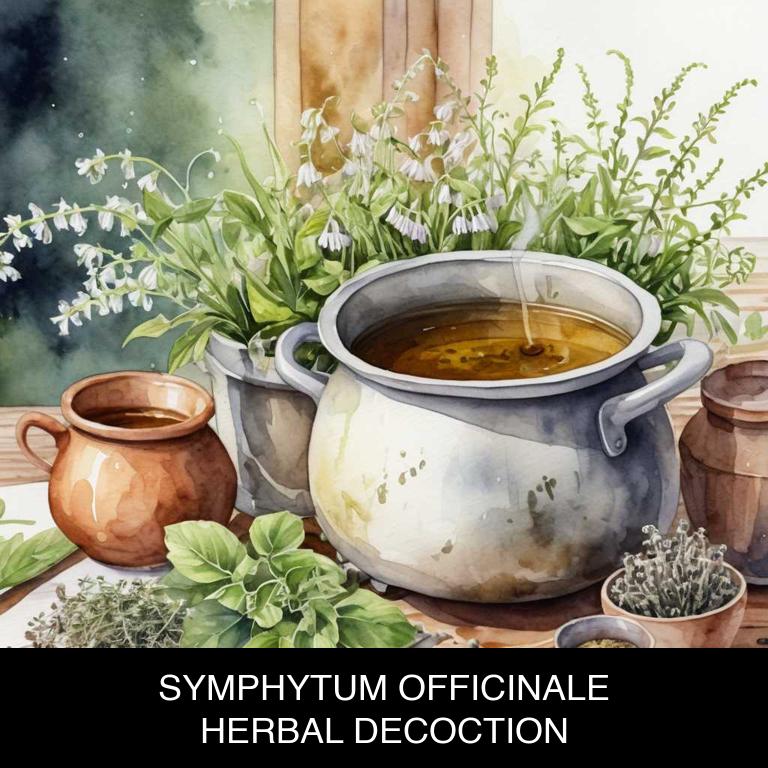
Medicinal Constituents
The list below shows the primary medicinal constituents in Symphytum officinale decoctions that help with gastritis.
- Alkaloids: Help with gastritis by reducing inflammation and soothing the mucous membranes in the stomach, thereby alleviating pain and discomfort.
- Flavonoids: Help with gastritis by their antioxidant properties, which neutralize free radicals and reduce oxidative stress, thereby protecting the stomach lining from damage.
- Triterpenoid saponins: Help with gastritis by their anti-inflammatory properties, which reduce inflammation and promote the healing of the stomach lining, thereby reducing symptoms of gastritis.
Parts Used
The list below shows the primary parts of comfrey used to make decoctions for gastritis.
- Roots: They are used due to their high mucilage content, which helps to soothe and protect the stomach lining.
- Leaves: They are used due to their anti-inflammatory properties, which help to reduce inflammation and alleviate symptoms of gastritis.
- Flowers: They are used due to their soothing and anti-inflammatory properties, which help to calm the stomach and reduce inflammation.
Quick Recipe
The following recipe gives a procedure to make a basic comfrey for gastritis.
- Gather 5-10 grams of dried symphytum officinale root and 1 liter of distilled water for decoction.
- Combine the root and water in a saucepan and bring to a boil over high heat.
- Reduce heat to low and simmer for 10-20 minutes or until the liquid has reduced slightly.
- Strain the decoction through a cheesecloth or fine-mesh sieve into a clean container.
- Allow the decoction to cool to room temperature before using or storing it in the refrigerator.
8. Sambucus nigra
Elder decoctions helps with gastritis because they contain antioxidants and anti-inflammatory compounds that soothe the stomach lining, reducing inflammation and irritation.
The decoction's flavonoids also help to protect the mucous membranes in the stomach from damage caused by digestive acids, which can exacerbate gastritis symptoms such as heartburn, bloating, and abdominal pain.
Additionally, elder decoctions may stimulate digestion and improve gut motility, promoting a healthier digestive system and reducing gastritis-related discomfort.
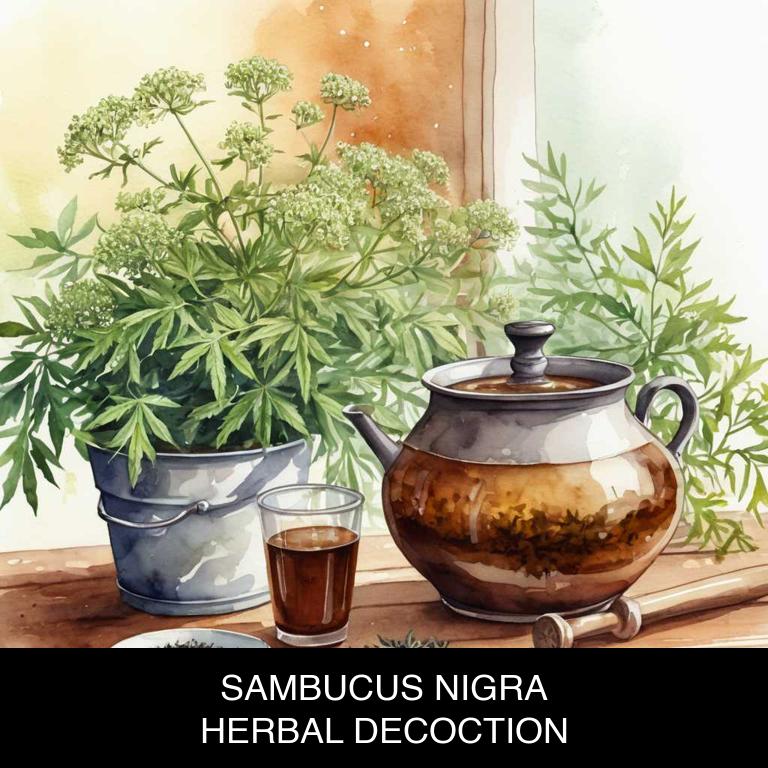
Medicinal Constituents
The list below shows the primary medicinal constituents in Sambucus nigra decoctions that help with gastritis.
- Flavonoids: They help reduce inflammation and oxidative stress in the stomach, alleviating gastritis symptoms.
- Tannins: They have a protective effect on the stomach lining, preventing acid damage and promoting healing of mucosal lesions associated with gastritis.
- Phenolic acids: They have anti-inflammatory and antioxidant properties, which help soothe the stomach, reduce inflammation, and alleviate gastritis symptoms.
Parts Used
The list below shows the primary parts of elder used to make decoctions for gastritis.
- Flowers: Used for their anti-inflammatory and antioxidant properties to soothe digestive issues.
- Leaves: Utilized for their astringent properties to help reduce inflammation and alleviate symptoms of gastritis.
Quick Recipe
The following recipe gives a procedure to make a basic elder for gastritis.
- Harvest 1-2 handfuls of fresh sambucus nigra flowers and berries or 50-100g of dried flowers and berries.
- Crush the sambucus nigra flowers and berries into a fine powder using a mortar and pestle or coffee grinder.
- Combine the powdered sambucus nigra with 250-500ml of boiling water in a saucepan or teapot.
- Steep the mixture for 5-10 minutes or until the liquid has reduced slightly and the flavors have combined.
- Strain the decoction through a cheesecloth or fine-mesh sieve into a clean container and discard the solids.
9. Passiflora incarnata
Maypop decoctions helps with gastritis because its anti-inflammatory properties soothe irritated stomach linings, reducing inflammation and discomfort.
The decoction's mucilaginous texture coats the digestive tract, protecting it from further irritation and allowing for a more efficient digestion process.
Additionally, maypop's flavonoids and phenolic acids have been shown to inhibit the production of pro-inflammatory enzymes, further alleviating gastritis symptoms such as bloating, nausea, and abdominal pain.
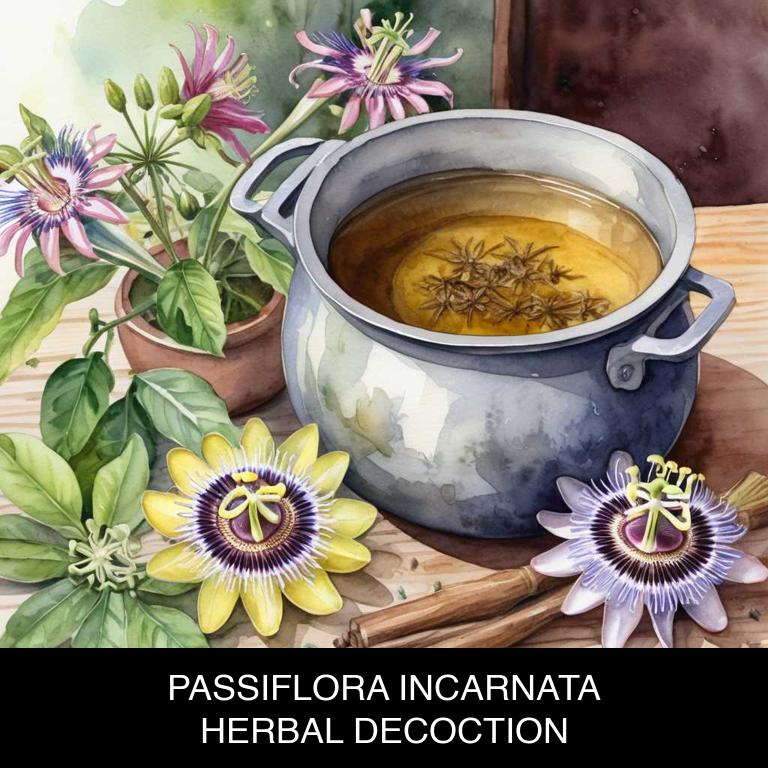
Medicinal Constituents
The list below shows the primary medicinal constituents in Passiflora incarnata decoctions that help with gastritis.
- Flavonoids: They help with gastritis by reducing inflammation, oxidative stress, and improving gut health, thus alleviating symptoms of gastritis.
- Harmane: It helps with gastritis by exhibiting antioxidant and anti-inflammatory properties, which protect the stomach lining from damage and reduce inflammation.
- Isophytosterol: It helps with gastritis by reducing inflammation and modulating the immune response, thereby protecting the stomach from further damage and promoting healing.
Parts Used
The list below shows the primary parts of maypop used to make decoctions for gastritis.
- Leaves: Leaves are widely used due to their high content of flavonoids, alkaloids, and glycosides, which have anti-inflammatory properties that help soothe gastritis.
- Roots: Roots are commonly used for their sedative and anti-inflammatory effects, which can help alleviate gastritis symptoms and promote digestive health.
- Barks: Barks are utilized for their antioxidant and anti-inflammatory properties, which may help protect the stomach lining and reduce inflammation associated with gastritis.
Quick Recipe
The following recipe gives a procedure to make a basic maypop for gastritis.
- Harvest 20-30 grams of dried passiflora incarnata flowers and leaves from a trusted source.
- Grind the dried flowers and leaves into a fine powder using a mortar and pestle.
- Combine 2-3 grams of the powdered passiflora incarnata with 1 liter of boiling water in a saucepan.
- Steep the mixture for 5-10 minutes to allow the herbal properties to infuse into the water.
- Strain the decoction through a cheesecloth or fine-mesh sieve into a clean container.
10. Rosa rugosa
Beach rose decoctions helps with gastritis because of its soothing properties that calm the digestive system.
The herbal infusion contains anti-inflammatory compounds that reduce inflammation in the stomach lining, easing discomfort and pain associated with gastritis. Additionally, beach rose has natural antacids that neutralize stomach acid, providing relief from heartburn and indigestion.
As a result, beach rose decoctions can help alleviate symptoms of gastritis, promoting digestive health and comfort.
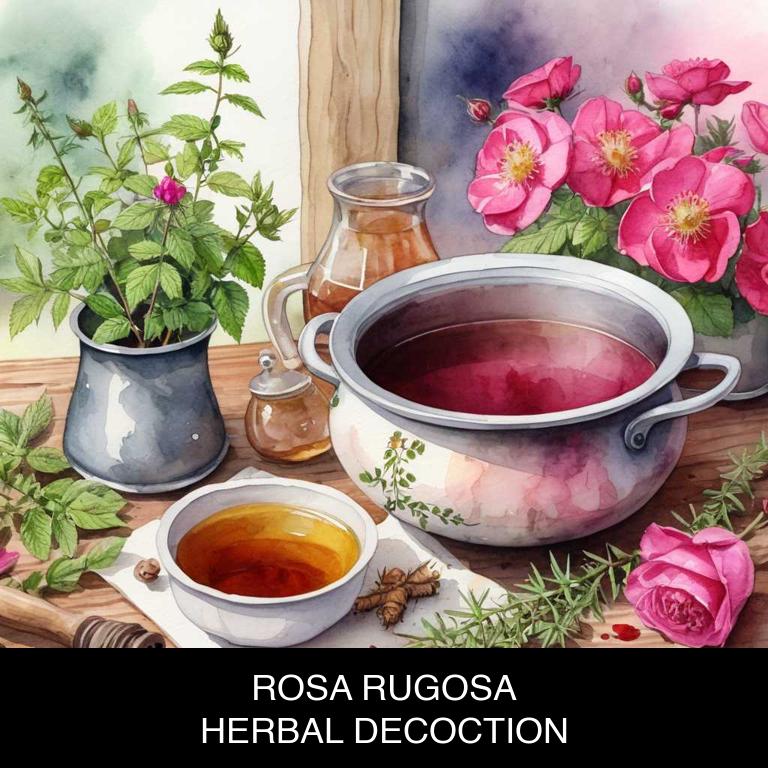
Medicinal Constituents
The list below shows the primary medicinal constituents in Rosa rugosa decoctions that help with gastritis.
- Flavonoids: These compounds help alleviate gastritis by reducing inflammation and protecting the gastric mucosa from oxidative damage.
- Phenolic acids: They possess anti-inflammatory and antioxidant properties, which contribute to their gastroprotective effects by reducing inflammation and preventing the formation of gastric ulcers.
- Rosmarinic acid: As a potent antioxidant and anti-inflammatory agent, rosmarinic acid helps to neutralize free radicals and reduce inflammation in the stomach, providing relief from gastritis symptoms.
Parts Used
The list below shows the primary parts of beach rose used to make decoctions for gastritis.
- Roots: They are used for their astringent and anti-inflammatory properties to soothe digestive issues.
- Leaves: They are used for their astringent and antioxidant properties to calm inflammation and protect the stomach lining.
- Stems: They are used for their astringent and anti-inflammatory properties to reduce inflammation and promote healing in the digestive tract.
Quick Recipe
The following recipe gives a procedure to make a basic beach rose for gastritis.
- Gather 1 cup of dried rosa rugosa flowers and 1 cup of dried rosa rugosa leaves for decoction.
- Combine the gathered flowers and leaves in a large pot and add 4 cups of water to it.
- Bring the mixture to a boil over high heat then reduce the heat to a simmer for 10 minutes.
- Strain the decoction through a cheesecloth or a fine-mesh sieve into a large bowl to remove solids.
- Store the resulting herbal decoction in the refrigerator for up to 3 days or freeze it for longer use.
What is the best combination of herbal decoctions to use for gastritis?
The best combination of herbal decoctions that help with gastritis is a blend of licorice root, slippery elm, and aloe vera.
Licorice root soothes the stomach lining, while slippery elm coats and protects it from irritation. Aloe vera's anti-inflammatory properties help reduce inflammation and promote healing. Additionally, ginger and peppermint can be added to alleviate nausea and discomfort.
This combination should be consumed in moderation, ideally 1-2 cups per day, under the guidance of a healthcare professional to ensure safe and effective treatment.
What ailments similar to gastritis are treated with herbal decoctions?
Ailments similar to gastritis/decoctions.html">gastritis/decoctions.html">gastritis that are treated with herbal decoctions are various stomach and digestive disorders.
These include ulcers, indigestion, diarrhea, constipation, and inflammatory bowel diseases such as Crohn's disease and ulcerative colitis.
Herbal decoctions made from plants like turmeric, ginger, slippery elm, and licorice root have anti-inflammatory and soothing properties that help alleviate symptoms of these conditions, promoting digestive health and comfort.